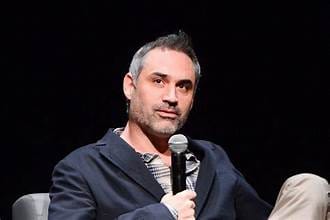"Dark Matter" Just Might Flip Your Synapses

Okay, I had to look it up too.
A synapse is in simplest terms a neurotransmitter important in activating key brain functions.
I first heard the word used casually from Jack Nicholson in an interview when I told him my wife and I were expecting a baby around mid-2002. Was I ready for the big moment? he had asked, and I said I hoped so. Jack: “Well, it’s gonna flip your synapses in ways you never imagined possible.”
True that. The synapses—which are the same brain junctions some think lead to cognitive betrayals during aging—were what Jack figured trioggered a change. (And then, two days after I first posted re this, came the skinny from the New York Times, via a study of abrupt gray matter reductions in new dads: "Fathers who lost more gray matter volume also said they enjoyed their infants more and reported lower parenting stress.")
What we’re truly talking about is the emotional stakes suddenly ramping fiercely up, in your brain and in your spirit.
We all know the ties of family are hard-wired. “All your life,” broods Joel Edgerton’s Jason Dessen near the end of the “speculative science” novel, also entitled "Dark Matter," that Blake Crouch wrote and has adapted for Apple TV+ (Episode 7 is out Wednesday, June 12). "You’re told you’re unique.," he muses, "An individual. That no one on the planet is just like you.
“It’s humanity’s anthem.”
Which is all true. But about a decade ago, author Crouch was feeling strained by the demands of his own success even as his family grew. Would he end up, as he wondered in a short essay presenting the book, “filled with regret for making the choice to allow space in your life for someone else’s needs and wants”? Or as he says elsewhere, in the voice of Jason, who forsook a brilliant career in experimental physics to teach the basics to disengaged local college students: “ I worried that my work would be lost, my ambition would die.”
Although this fear of later regret is common enough, almost nothing about the way the novel (and series) fleshes out what comes after, as Jason formulates a kind of mad-scientist chemical compound that activates—hang in with me—the brain’s pre-frontal cortex to generate a special state of consciousness. In Crouch's book and series, that altered consciousness takes our hero, and others, on an at times terrifying, at times exultant journey through time and space.
“A thriller with a backbone of speculative science,” is what the author dubs it, and in building the story’s imaginative world, he lives up to a quote he shares from Albert Einstein, no less: “The most beautiful thing we can experience is the mysterious”.
This might all sound a bit derivative given the amount of sci-fi, genre-bending, and accounts of imaginary worlds we see everywhere--on all the streamers (“Westworld,” or take your pick around the offerings, including Apple’s close cousin to “Dark Matter,” “Constellation”), and also in cinemas.
Also emblematic is “Inception,” among other Christopher Nolan big swings including “Oppenheimer” with its mysteries beyond even Einstein’s ken. Let’s just say the noted analogy of Schrodinger’’s Cat”:
https://sciencing.com/schrodingers-cat-simplified-what-is-it-why-is-important-13722577.html
…which was used to deflate earlier physicists‘ “Copenhagen theory,’ is a quaint chestnut has been getting a real workout on our various screens lately.
In fact, this newsletter paid heed to a somewhat overlapping small-screen exploration seen in Alex Garland’s (at times intriguing) streaming series “DEVS”:

But keep in mind Crouch published “Dark Matter” eight years ago, having already accomplished the (in some ways kindred) “Wayward Pines” trilogy. (He’s producing plenty of content on various platforms at this writing--so cheers to his family now that he’s gotten them through the earlier phase.) His clear humane intent and resolute cleaving to the verities of blood above all means it’s a series that even physics-challenged squares can enjoy.
Reviews have been largely positive, and the show is currently top-ranked among Apple streaming fare, earning a shoutout from Appple chief Tim Cook in the company's AI-centric promo short about a system-wide reboot of sorts.
As Crouch explains, he trod into the arcane scientific part trepidatiously: “But I knew that if I pulled it off, it would let me play with some really big ideas about our day-to-day existence and the choices we make that haunt us. It allowed me to build a really cool, far-out thriller plot around themes that felt very grounded and meaningful to me.
“To me, it’s the love and family elements that make up the beating heart of `Dark Matter’.”
This viewer, unequipped with that clue to the creator’s premise, was in no great hurry to catch up with the series when it began to air on May 9 this year. As noted, the premise of a man trying to work his way through an identity conundrum didn’t sound all that fresh, and the characters’ potential wrangling with a murky multiverse seemed perhaps cued up as indulgent.
It was a slow-dawning surprise to find “Dark Matter,” would thread its plot-generating complexities through the he deeper verities of fatherhood, marriage, and the hard-earned decency that emerges from keeping family enterprises afloat. At the center of this, at times frenziedly stumbling, run through alternating horrors and moments of grace, we find leads Edgerton and Connelly: each are convincing, authentic, and in a studiously mature way, convincingly sexy.
Among the bonus characters who emerges even more arrestingly than in the novel is Alice Braga’s Amanda. Amidst an actors’ round robin in which each featured player delivers two personae, she is both an edgy corporate shrink and a glamorously alluring version of a girl next door. She is effectively we the audience in certain ways – the waif in a psychic storm who wholly engages our empathy. (It’s a very different role from her emergence several years back as the killer queen of a Latin drug empire, which has led to a robustcareer as the darting-eyed, fictive heroine you can’t stop staring at.)
To avoid spoilers, for the show gradually leaks out clues and pathways in a deliberate fashion with minimal labored exposition, suffice it to say that the imagination-driven “box pilots” (voyagers who mind-journey out of a high-tech box into strange psychic realms with wonders and terrors reflecting their own psyches) consistently grab and hold our attention. And should Apple decide to extend the series—as they have been inclined to do with other worthy entries in their growing library in the speculative science genre—there’s plenty of room for exploration in Crouch’s distinctively etched multiverse.
Thanks to the detailed performances, it’s not a series for distractedly second-screening. Look for Oakes Fegley, as Jason’s son Charlie, who casually owns the story’s rare doled-out laugh lines; you see a future for the actor who cannily embodies the resentments and occasional glimpses of throttled warmth we recognize from late adolescence. We are deep in the nine episodes when he comes to the fore in important ways.
The needle drops deserve mention, whether a blast of Queen’s “Perfume Genius”, a dose of Coldplay’s “Sparks,” a ditty from FKA Twigs, and perhaps best of all, a goodly showcase of Bob Dylan’s “Visions of Johanna” playing underneath (now there's a jukebox!)as our hero sweats out a barroom meet-up with a doppelganger.
At one stage, watching Edgerton killing time by repeatedly tossing a ball against a wall, you may be forcibly reminded of Steve McQueen in a jail cell in “The Great Escape”. (More forthrightly showing a slight lean to sentimentality, at a different stage we’re given a good look at a cinema marquee billing that storied movie hymn to rediscovering heartfelt things, “It’s A Wonderful Life.”)
A strength of Crouch’s conception is that the characters steadily become more concretized, more poignant, more embraceable; recruiting Connelly as the story’s epitome—twice over, in fact– of a desirable, creative, quietly sensual spouse, was a crucial advantage. Edgerton, with his watchful edginess, is a fine match. Add in Fegley’s take on son Charlie, and some of us will almost reminisce over the cloistered world the pandemic showed us, the “messy and beautiful life” we’ve clung to--or not. For many, the synapses will bathe restfully in the comfort of knowing that for this trio, the mess and the beauty are both fully owned. Ultimately, a voice viewers will come to know sums up what the family's struggles have wrought: “They’ve shaped you into a more perfect puzzle that can only fit one another.”



Comments ()